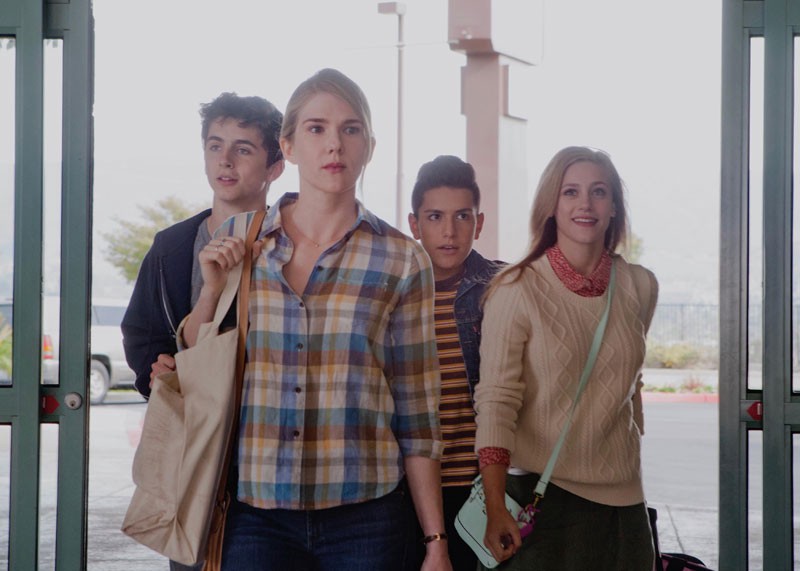Interview by Laura Berger
Julia Hart’s debut script “The Keeping Room” landed on the Black List and was made into a feature directed by Daniel Barber starring Brit Marling. She’s written for John Requa and Glenn Ficarra at Fox Searchlight, Ridley Scott’s company Scott Free and has a mini-series in the works at HBO with Anna Paquin and Jack Black. “Miss Stevens” is her feature directorial debut.
“Miss Stevens” premiered at the 2016 SXSW Film Festival and opens today, September 16 in select theaters and on VOD and digital on September 20.
W&H: Please give us your description of the film playing.
JH: Stuck at a crossroads in her personal life, it falls on Miss Stevens to chaperone three of her students — Billy, Margot, and Sam — on a weekend trip to a drama competition. Exploring the fine line between being a grown up and being a kid, “Miss Stevens” is about students becoming teachers and teachers coming to realize that the messiness of youth never really goes away.
W&H: What drew you to this story?
JH: We were initially drawn to write the story because I used to be a teacher. And I feel very strongly that most of the portrayals of teachers on film and television are not all that accurate. I wanted to tell an honest and authentic portrayal of what it means to be a young woman in charge of people who aren’t that much younger.
W&H: What was the biggest challenge in making the film?
JH: Our son was 10 months old when we started shooting and I can honestly say that directing a movie was easier than having to cope with seeing so little of him. There would be days where we’d leave for set before he woke up and get home after he’d gone to bed. We actually shot until 7 a.m. the day of his first birthday.
I think having that kind of love and longing makes any drama that occurs on set seem a lot less important. He inspires me every day to be my best self and do my best work.
W&H: What do you want people to think about when they are leaving the theater?
JH: I want them to think about how they feel — and I hope they feel good. I want them to feel like they just spent some time with friends. But friends who there was maybe some stuff going on that they didn’t know about but now they do. I want them to feel happy, and also I want them to feel a little bit sad. I guess like how parting from a good friend always feels. Like saying goodbye.
W&H: What advice do you have for other female directors?
JH: Tell female stories. I don’t know, maybe I’m not supposed to say that, but if we don’t, who will? Some of my favorite female characters were written by men. I’m not saying men can’t [write women]. I’m just saying, they’ve got men covered. They’ve got them covered in spades. So let’s tell a few stories about women while we’re here.
W&H: What’s the biggest misconception about you and your work?
JH: I don’t think I’ve been around long enough for people to have misconceptions about me or my work. So I’ll just say that I’m here to tell the untold stories because there are so many of them, and I’m going to do my best to tell them without cynicism or judgement. I can’t say I’m always going to get it right, but I’m going to try.
W&H: How did you get your film funded? Share some insights into how you got the film made.
JH: We wrote the script, put the main cast together, put together a look book and then the sales agents at WME and ICM sent the package out to several financiers who they thought would respond to the material. Beachside responded almost immediately.
They really got the story and the characters and the movie we wanted to make from the very first time we all met up. And from there we were off to the races.
W&H: Name your favorite woman-directed film and why.
JH: Sofia Coppola’s “Lost in Translation.” Coppola manages to capture so much with so little. Everything is minimalist — from the script, to the costumes, to the performances. It’s so subtle and small and detailed and at the same time so completely full. The performances are as beautiful as the compositions.
I just love when I see a piece of art that was clearly made how it was supposed to be made. Everything aligns. To me, that is the sign of good directing: when the whole feels bigger than the sum of the parts. I could watch that film once a week and still find new things and then tear up at the end, every single time.







